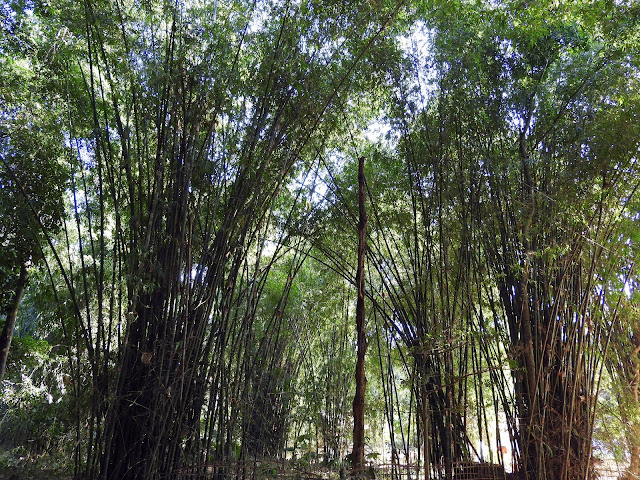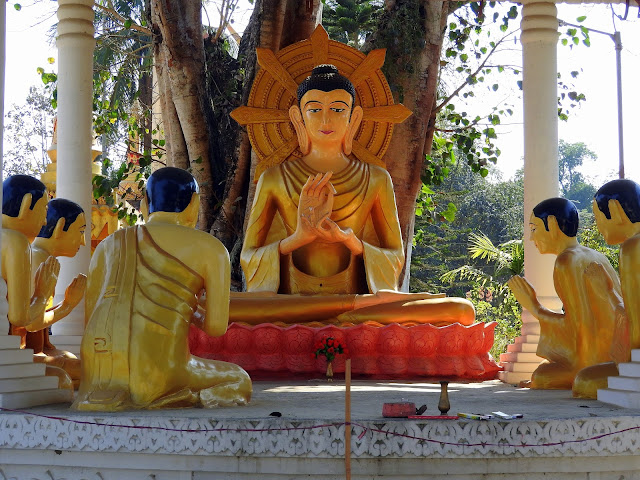“Where have you reached?”
“Where are you right now?”
“Ask anyone for the bus-stand and get to the bus from there.”
“No, no. It cannot be that the last bus for the day has already
departed. Have you asked the people at the bus-stand? Oh okay. Ask for the
shared vehicles that ply then…”
We’d just gotten off a bus from Tezpur and were a bit hassled. Amidst
which, I was on a call and my friend was looking quizzically at me. You would
too. 3000 kilometres away from the state whose official language it is, I was speaking
in Marathi to a voice on the other end of the call!
Except that I was speaking to someone in Assam!
 |
| There's something about bamboo plantations... Something about the way sunlight filters through |
 |
| If I lay here.. If I just lay here... |
A quick rewind
Piran Elavia runs a socially responsible travel enterprise – Kipepeo –
that offers an insight into local communities and the local eco-systems of the
region. So evidently, Piran’s was one among the many brains I had picked on
while planning my northeast India sojourn. It was on his recommendation that I
first became aware of the Namphake Buddhist monastery and the community of the
Tai Phaks – a branch of the Tai race that is a part of the same Mongoloid pool
the royal family of Thailand belongs to as well.
And this was why my friend and I had arrived at Dibrugarh after Tezpur.
 |
| Entrance of the Namphake Buddhist Monastery | Dibrugarh, Assam |
 |
| Entrance of the Namphake Buddhist Monastery | Dibrugarh, Assam |
 |
| Inside the Namphake Buddhist Monastery | Dibrugarh, Assam |
Through Piran, I had gotten in touch with Raviji, the caretaker of the monastery. That someone I was speaking to
on the phone in Dibrugarh happened to be Raviji. And although we had spoken about my visit much I advance, the
reason I didn’t know who I was speaking to that evening was because we had: (a)
never conversed in Marathi and (b) he was calling me from another number!
Incidentally, Raviji is from
Maharashtra and has a very interesting story. He worked as a junior clerk with
the forest department for about 16 years before he met a Buddhist monk who he
decided to accompany as a disciple. Through that association which lasted for
about 29 years, Raviji came to know
of Namphake where he has been now for over 12 years!
Conversations
The morning after we had arrived, we accompanied Raviji for a tour of
the monastery which was built in 1850 and a walk through the village adjoining
it.
During our walk through the village, we were invited to the house of Oksoan
Tumtein – a silver haired lady who had recently gotten her son married. The coy
couple would sheepishly exchange glances with each other while looking away
every time they found either one of us looking their way. Such is the degree of
the privacy these communities have been used to for generations that our very
presence (let alone the camera) feels like a huge intrusion. But our hosts are
polite.
 |
| In conversation with Oksoan Tumtein | Dibrugarh, Assam |
 |
| Inside Oksoan Tumtein's home | Dibrugarh, Assam |
 |
| Homes built on stilts | Dibrugarh, Assam |
Speaking of marriages, over a cup of tea and with Raviji being our
mediator and translator, Ms. Tumtein tells us how it is women who officiate the
ceremony. In fact, the marriage proposal is brought by the older women of the
family and tobacco leaves are exchanged as a symbol of acceptance of the
proposal. The concept of a wedding invitation has been redundant as it spreads
through the entire village by word of mouth – in other words, nobody is
excluded from partaking in the celebration.
We also had a chance to meet with the chief of the village, Ngikya
Weingken and from whom we learnt that the word Phake comes from two Tai words:
Pha meaning wall and Ke meaning old. It is said that this community used to
live beside old stone walls along the banks of a river in houses built on
stilts as the area used to be flood prone.
Probing our understanding of the community’s beliefs and practices, we
learn from Ngikya how the entire community celebrates every full moon. And this
is outside of Karthik Poornima which happens thrice a year during which they
assemble for three full days and Buddha Poornima which is celebrated on a grand
scale once a year.
What I found rather intriguing and fascinating is how the day of the
week and the birth order determine what a child would be named. However, if it
is a boy his name begins with the day of the week, whereas if it is a girl, her
name ends with the day of the week!
 |
| Lunch preparations underway | Dibrugarh, Assam |
 |
| The chief of the village, Ngikya Weingken | Dibrugarh, Assam |
The past and the future
We were told that the Tai Phakes have had to be constantly on the move
owing to displacement due to climatic conditions or political situations. They
have been known to have extended from Yunan Province in China to Hokam Valley
in Myanmar via Thailand and to Assam in India over the centuries. It was during
a Burmese invasion that the Tai Phakes sought asylum by settling along the
banks of Burhidihing – which is the present day Namphake. Their entry into
India can be traced back to 1776 (if not earlier) and it is said that their
population – of 2000 – has remained almost constant ever since!
Currently, the Tai Phakes are settled in the Dibrugarh and the
Tinsukia districts of Assam. The Tais practice Buddhism.
As a spectator from the outside one can barely tell how seamlessly they have integrated themselves within the geography of Assam and yet retained their own culture – which is said to be in its purest essence and had been the catalyst that triggered the curiosity of the royal family of Thailand.
“The princess of Thailand visited us in 2009 after our community and
our origins got mentioned by an international magazine. Subsequently, the king
made a visit too and this was telecasted live. We’ve seen a surge in the influx
of tourists as well as writers and researchers who want to talk about us (and
earn a buck or two by doing so).
The thing is, exposure of this kind is a double-edged sword. You know,
there is talk about turning this village into a tourist hotspot and what they
mean by this is to make it a mini-Thailand. Do you see what that would do to a
community that has been able to retain its distinct history and way of living
simply because it remained ensconced away from the mainstream world? The same
reason that has garnered us all of the attention is going cause the dilution
and the downfall of our distinctiveness!” That same evening we’d had a chance
run-in that developed into a heartfelt conversation with a gentleman named Aicheng
Weingken – who was Ngikya’s uncle and the former village chief.
 |
| Chatting up with Aicheng Weingken | Dibrugarh, Assam |
For a community that hasn’t had a single FIR registered and maintains
a zero crime rate till date, opening its doors to the outside world raises many
questions; questions to which the community has to collectively arrive at a
consensus on.
But how?
--
#BeYouForYou
I am facilitating a Be You For You workshops in Mumbai and Bangalore! Drop me an email on nomadicthunker[at]gmail[dot]com if you're interested in attending and would like to know more.
August 19: https://www.facebook.com/events/457157031305289/
Upcoming Bangalore workshop dates
September 23: https://www.facebook.com/events/1854052274855147/
